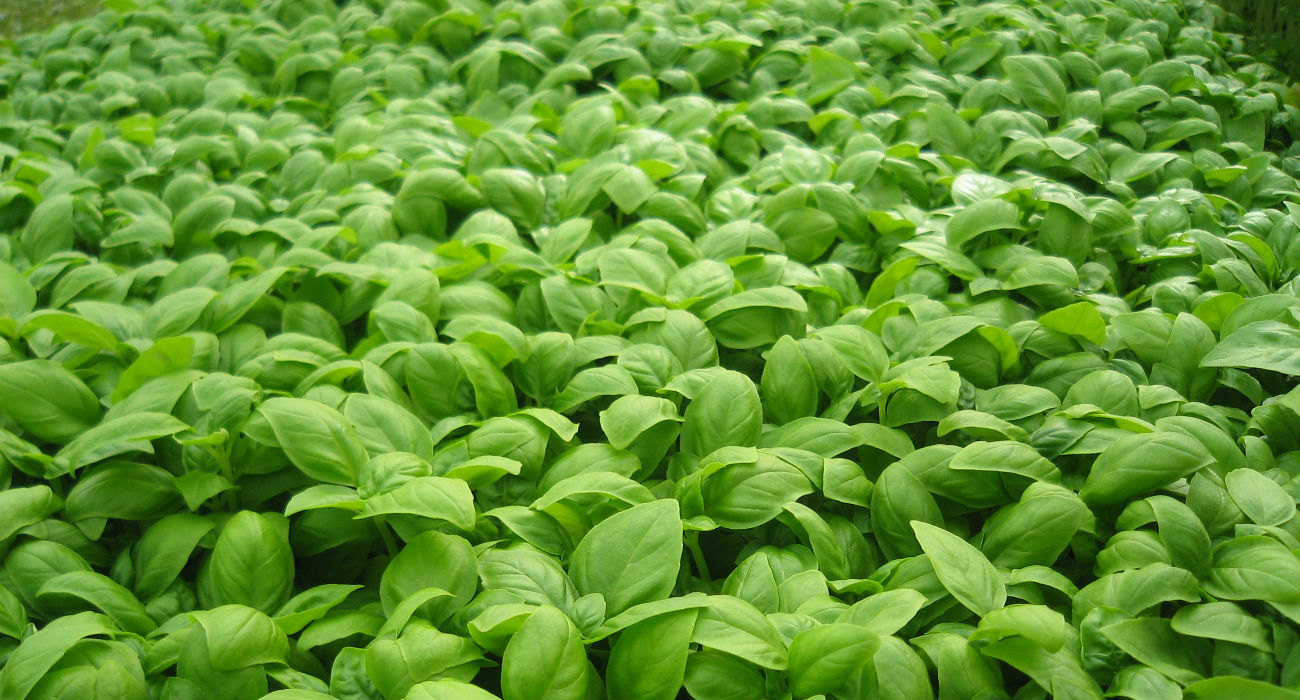- Basil is a highly aromatic herb whose scent and taste reminds of clove
- Its intense fragrance and the unique touch it adds to dishes have turned it into a staple ingredient in many cuisines, particularly in Italy
- Rich in nutrients, basil is also highly beneficial to health

We at Dinafem couldn't agree more with the statement "you are what you eat". We always recommend growing cannabis organically to prevent harmful substances from getting into your body, and the same applies to food. Intensely flavoured and aromatic, this month's plant is a habitué of lunches and dinners, particularly in Italian cuisine. Plus, it has many beneficial health properties. Keep reading to find out more.
Short description of basil
Basil (Ocimum basilicum) is an herb that belongs to the family of Lamiaceae, one of the largest families in the plant kingdom. Its leaves are rounded, pungently scented and complete their life cycle in one year, with the exception of tropical climates, where the plant becomes perennial. There are many varieties of basil with different flavours and aromas, sweet basil being the most widely used because of its unique, pungent scent -similar to clove due to its high eugenol content. Lemon basil, instead, is rich in limonene, which, as its names suggests, gives it a citrus flavour.
Origins and cultivation of basil
Native to Iran, India, Pakistan and other Asian regions, where it has been grown since ancient times, this herb owes its worldwide popularity to its intense aroma, highly appreciated for culinary purposes. Extremely sensitive to low temperatures, basil thrives in the sun but needs also lots of water. If not grown in the right conditions - excess cold or sun and lack of watering - the leaves of this delicate herb start to darken and eventually die, as it has a natural tendency to become necrotic.
Uses of basil
Basil is known for its use in cooking, particularly in Italian cuisine, where it is the main ingredient of the iconic pesto sauce. Its intricate flavour adds a unique touch to dishes, making it an essential element of many recipes. But basil is not exclusive to Italy, as this versatile herb is a central ingredient of countless Thai and Vietnamese dishes.
Properties
Besides tasting great, basil has many beneficial health properties and has been used for centuries in Ayurveda, the traditional Indian medicine. These are the health benefits of basil, according to science:
- Anticancer properties
A number of studies suggest that some of the compounds found in basil, among which eugenol and rosmarinic acid, can help prevent certain types of cancer, particularly lung, liver and skin cancer. Apparently, basil is a powerful antioxidant that contributes to slowing down cell division.
- Antioxidant properties against ageing
Basil neutralises the free radicals that cause ageing of the liver, the brain and the heart, and is also a great anti-inflammatory. According to some studies, beta-caryophyllene -a terpene found in the herb - can contribute to reducing both local and systemic swelling, and is therefore useful in the treatment of diseases like arthritis.
- Antibacterial properties
Basil possesses antibacterial properties that can prevent the growth of different types of bacteria. So just by adding some leaves of this wonderful herb to your salads, you can contribute greatly to your body's wellbeing.



Comments from our readers
There are no comments yet. Would you like to be the first?
Leave a comment!Did you like this post?
Your opinion about our seeds is very important to us and can help other users a lot (your email address won't be made public).